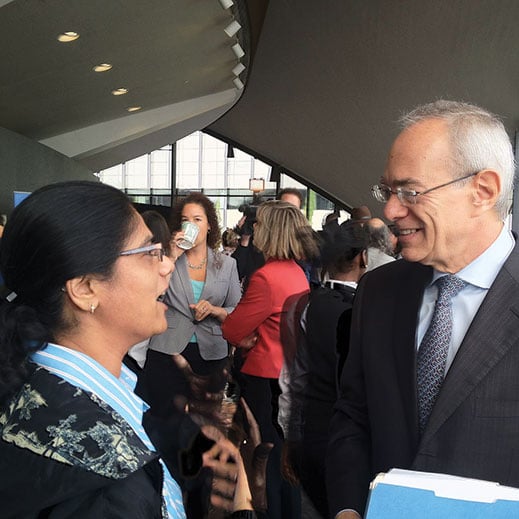The first day Rishi Patel ’14 stepped into Professor Anant Agarwal’s Circuits and Electronics class at MIT in 2011, he was hooked.

After telling his parents how great 6.002 was, Patel had a strange experience: his mother and father signed up for it too.
The senior Patels joined 155,000 others the next spring in 6.002x, Circuits and Electronics—the first massive open online course (MOOC) offered by MITx, which has grown into edX, a multi-university effort now headed by Agarwal.
Only 7 percent completed the course and received a certificate. Rishi’s mother, Sonal, was so proud to have been among them that she asked Agarwal and President L. Rafael Reif to autograph her certificate.
“Rishi said, ‘Okay, take it if you want to, but don’t ask me for help!’” Sonal says. “He was a little surprised to see his parents doing p-sets at this age! Still, it was the best experience and the best way to connect with MIT and our child.”
Sonal works on distance learning at Harvard Extension School, so taking the course also helped her better understand online learning. Her husband, an astronomer, completed 6.002x as well.
Agarwal says embracing texting has helped him communicate with his own teenage daughter. Parents and teachers both need to accept changing technology, he said in a TedGlobal talk this year. “Let’s embrace technology and the millennial generation’s natural predilections.”
Sonal Patel has since enrolled in two more edX courses. In online discussion groups, she found a growing body of MIT parents like herself taking their children’s courses alongside, or soon after, them. She formed an MIT parents Facebook group, whose page has become a place to recommend courses, discuss their children, and praise their favorite professors.
Chris Gunning ’82 joined the group. “I’m a big believer in edX,” he says. “It’s a fantastic resource for students of all ages all over the world.”
Gunning, a software engineer at Hewlett-Packard, also enrolled in Agarwal’s 6.002 class, which he loved as a student 30 years ago. “I was interested in seeing how the online class compared to it,” he says. “I really enjoyed Professor Agarwal’s presentation style, and taking the class was a great refresher for me.”
Gunning’s daughter Victoria is a Course 6-3 junior. “She hasn’t taken any classes through edX, but she highly recommended 7.00x, Introduction to Biology, based on how much she enjoyed Professor [Eric] Lander in 7.012,” says Gunning, who signed up for that course too.
“Victoria was unimpressed when I aced all the p-sets and tests,” Gunning says of his performance in 6.002x. “She expected that of me since it was my second time taking the class. Given how much I’ve forgotten, I wasn’t nearly as confident as she was.”
Vani Thilagar’s daughter Lasya Thilagar ’15 took 6.00, Introduction to Programming, in 2011 and enthusiastically recommended it to her mother, who took the virtual version the following fall.
Her children got a kick out of it, says Thilagar, an independent software engineer. “They would check up on me—‘Did you finish your assignment yet?’ and ‘Don’t procrastinate, it can take longer than you think!” Thilagar recalls. “Sometimes they were very helpful, saying, ‘We’ll take care of making dinner—you go finish your exam.’ Finally, they said they were very proud of me when I got an A!”
Thilagar speaks with the vim of a newcomer to MIT. And now she’s hooked. She signed up for Anthropology 207x, Introduction to Human Evolution, last fall.
Many parents enjoy classes and appreciate the insights they gain about their students’ college lives. “What really drove me to edX, and [certain] classes in particular, was taking a class that I knew that my daughter had taken or would eventually take,” says Ric Cazares, who is the parent of a junior and has completed 6.002x and 2.01x, Elements of Structures. “Even though our respective experiences with the classes are very different, I feel good knowing that I have a feel for a couple of her classes.
Keep Reading
Most Popular
Large language models can do jaw-dropping things. But nobody knows exactly why.
And that's a problem. Figuring it out is one of the biggest scientific puzzles of our time and a crucial step towards controlling more powerful future models.
The problem with plug-in hybrids? Their drivers.
Plug-in hybrids are often sold as a transition to EVs, but new data from Europe shows we’re still underestimating the emissions they produce.
How scientists traced a mysterious covid case back to six toilets
When wastewater surveillance turns into a hunt for a single infected individual, the ethics get tricky.
Google DeepMind’s new generative model makes Super Mario–like games from scratch
Genie learns how to control games by watching hours and hours of video. It could help train next-gen robots too.
Stay connected
Get the latest updates from
MIT Technology Review
Discover special offers, top stories, upcoming events, and more.